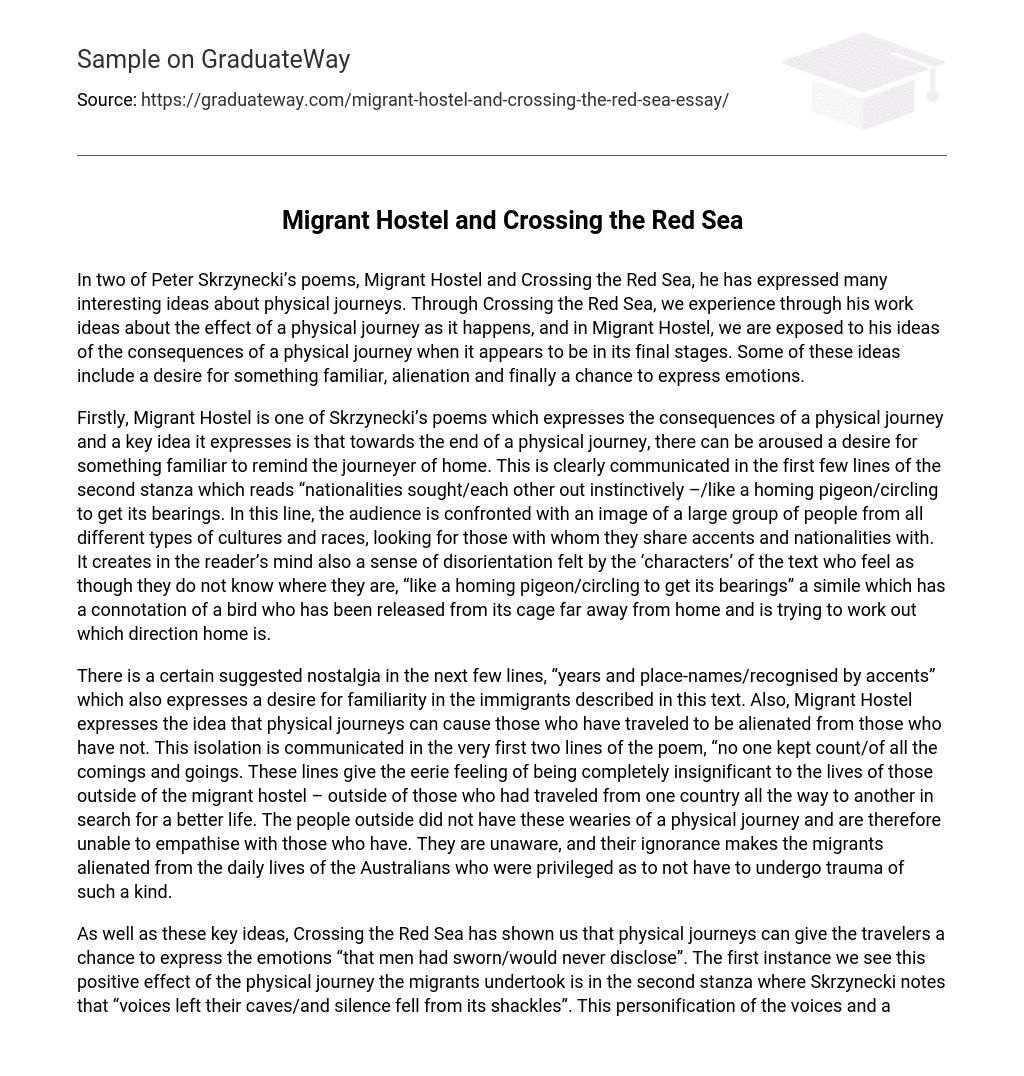In two of Peter Skrzynecki’s poems, namely Migrant Hostel and Crossing the Red Sea, he explores numerous intriguing concepts related to physical journeys. In the poem Crossing the Red Sea, Skrzynecki presents his thoughts on the immediate impact of a physical journey, while in Migrant Hostel, he delves into the aftermath and outcomes of a physical journey nearing its completion. Noteworthy ideas encompass the longing for familiarity, feelings of isolation, and ultimately, an opportunity for emotional expression.
One of Skrzynecki’s poems, Migrant Hostel, illustrates the aftermath of a physical journey and conveys the idea that at the end of such a journey, a longing for something familiar may arise to remind the traveler of their homeland. This notion is effectively portrayed in the opening lines of the second stanza: “nationalities sought/each other out instinctively –/like a homing pigeon/circling to get its bearings.” These lines present an image of a diverse group of individuals in search of those who share their accents and nationalities. The reader is also able to perceive the disorientation experienced by the individuals in the poem, depicted by their unfamiliar surroundings. The simile “like a homing pigeon/circling to get its bearings” invokes the image of a bird released far from home, attempting to discern the direction towards its familiar abode.
The following lines in the text suggest a sense of nostalgia, as they mention “years and place-names recognized by accents.” This also reflects the immigrants’ desire for familiarity. “Migrant Hostel” conveys the idea that physical journeys can lead those who have traveled to feel alienated from those who haven’t. The first two lines of the poem, “no one kept count of all the comings and goings,” create a sense of insignificance in the lives of those outside the migrant hostel. These individuals lack understanding or empathy for the migrants’ experiences, as they haven’t undergone a physical journey themselves. Their ignorance further isolates the migrants from the everyday lives of Australians who have been fortunate enough to avoid such traumatic experiences.
Crossing the Red Sea has demonstrated that physical journeys can provide an opportunity for travelers to reveal deep emotions once concealed. In the second stanza, Skrzynecki illustrates this positive outcome, as “voices left their caves” and “silence fell from its shackles”. By personifying the voices and silence, it becomes evident that individuals were beginning to speak. Additionally, the line “the sea continued – breaking into walled-up griefs” paints a vivid picture of the sea eroding a metaphorical sandstone wall, representing the migrants’ suppressed emotions. The physical journey aids in breaking down these emotional barriers, enabling them to gradually confront their inner grief and trauma. The phrase “echoes and reflections of the trust that men had bartered for silence” signifies a new agreement amongst the men. They have exchanged silence for the opportunity to express their pent-up emotions, thus embarking on a healing process that will provide them with greater emotional resilience as they approach the conclusion of their physical journey.Skrzynecki’s poetry conveys three significant ideas regarding physical journeys, emphasizing their importance and the resulting positive and negative consequences.





